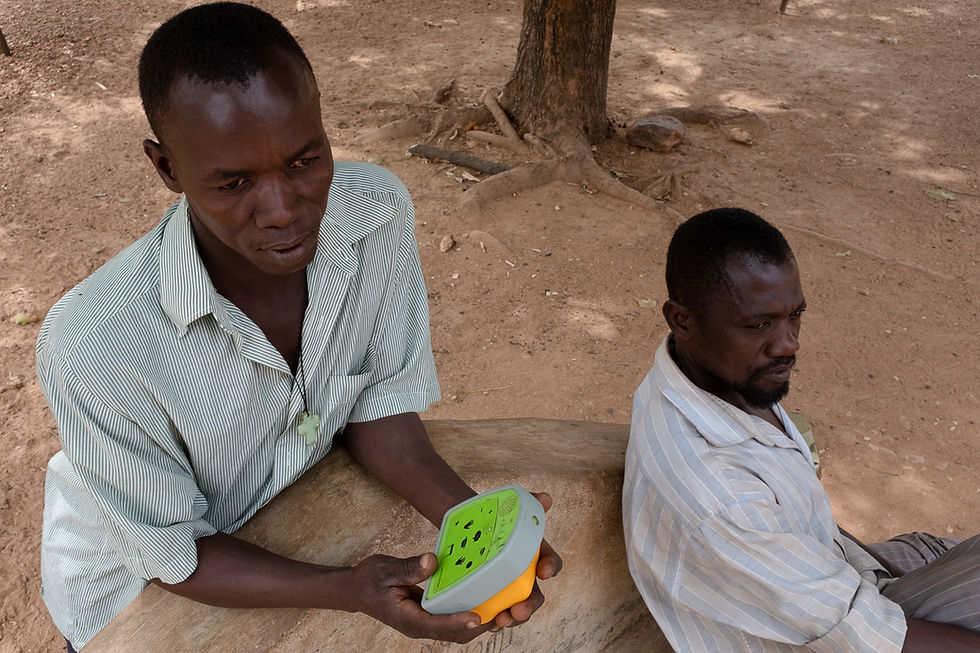Educating Communities About Mental Health Issues, Treatment, and Prevention
- Erin Inclan

- Oct 10, 2022
- 3 min read
Updated: Oct 10, 2022

After Ghana's Mental Health Act (act 846) was passed in 2012, Ghana Health Service (GHS) shifted its mental health programming from facility-based to a more integrated community-based approach. GHS set up new structures, including regional, district, and facility-level mental health coordinators. But in the Upper West Region, under-resourced rural health workers struggle to deliver adequate mental health education.
Although GHS established self-help groups, only about 30 groups are active in the region, which has a population of over 900,000 people. Mental health education is left to community health workers and volunteers who have no formal mental health training. The mental health coordinators also lack access to training and support.
To address the challenge, Amplio partnered with GHS and UNICEF to help improve mental awareness and education through a Talking Book project. The effort was part of an ongoing public health initiative. In 2019, we partnered on a Talking Book pilot at five Community-based Health and Planning Services (CHPS) compounds. Community health nurses and volunteers used Amplio Talking Books to deliver consistent and accurate health messages through group listening sessions and household sensitization.
In 2020, the team updated the Talking Book and pivoted to deliver an award-winning COVID-19 awareness campaign, reaching communities with consistent and accurate messages on COVID-19 symptoms, risks, and treatment.
The project scaled again in 2021, with 327 Talking Book devices distributed to 27 CHPS compounds and 20 mobile units. The content was produced in the three local languages and covered a range of topics, including maternal and child health, men's role in health, COVID-19, hygiene and sanitation, and disease prevention — as well as mental health.
As of June 2022, the CHPS Talking Book project had delivered community health education to more than 150,000 women, men, and youth in 10 districts.

A CHPS nurse conducts a listening session, with a Talking Book attached to a battery-powered outdoor speaker.
Responding to Mental Health Issues
In 2020, when the government’s COVID-19 safety protocols included travel restrictions and the closure of schools, churches, and mosques, Amplio Ghana worked with GHS and UNICEF to address a spike in depression and domestic violence.
“When we saw an increase in gender-based violence during the pandemic, we were able to update the Talking Books with new content to promote mental health and peaceful homes, including information on where to get help,” shared Fidelis Da-Uri, Amplio Ghana's senior content manager. "We also addressed COVID-19 stigma."
For the CHPS project, Fidelis led the design of social and behavior change content to improve awareness, prevention, and treatment of maternal depression. “Some of our programs in the past also captured mental health. For example, UNICEF Ghana’s Talking Book program expansion in the Upper West and Northern regions included maternal depression as part of its C4D messaging,” he said.
Youth Mental Health and Substance Abuse
In response to feedback from the communities, including Talking Book user feedback, Fidelis and the CHPS partners updated Talking Book content to address issues related to youth mental health, especially drug and substance abuse.
“For the CHPS concept, the topic of drug and substance abuse was included from the start, but our team is always responding to emerging issues and requests. During our CHPS inception meetings, in preparation for scale-up in new districts, we received feedback on youth mental health awareness content creation,” Fidelis said.
"With most of the Talking Book programs we implement, we try to update the content about once a quarter. This allows us to respond to community needs."
Providing a Community Feedback Channel
One of the Talking Book’s unique features is the user feedback function. With the built-in microphone, users can record their questions or comments. This gives people a way to share their thoughts or experiences about sensitive topics that they might not be willing to discuss in a group or public setting. The user feedback is anonymous unless a person chooses to identify themself. However, the data on each device is linked to a specific group or community, allowing Amplio and its partners to identify and respond to emerging issues and trends, including barriers to behavior change.
This post was originally published on the Global Washington website in March 2022.

![Meet a VSO Zambia Health Champion: Bartholomew Sunga [Cross-post]](https://static.wixstatic.com/media/52afcb_05b83ba37c7f4c40b7450b984424b9eb~mv2.jpg/v1/fill/w_600,h_400,al_c,q_80,enc_avif,quality_auto/52afcb_05b83ba37c7f4c40b7450b984424b9eb~mv2.jpg)
